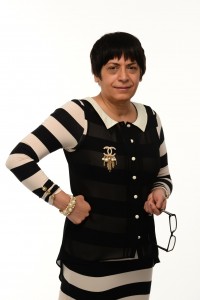Comment by Professor Pooran Wynarczyk:
I am sure there are few people who don’t know who Professor Brian Cox is but how many have heard of Dr Maggie Aderin-Pocock?
Since 2011 there has been a surge in the take up of science and maths A- Levels, and this has been attributed to the popularity of the physics professor and TV presenter, Brian Cox, a prime example of the effect exposure to positive role models can have.
And as International Women’s Day approaches I have one message: we must stop focussing on the under representation of women in business, and celebrate the great role models we have to get more women into science, technology, engineering and math (STEM) subjects.
When people asked to name a female scientist, most come up with ‘Marie Curie’. This is not to deny the fact that she was truly a remarkable woman but there are many other women around the world whose accomplishments should be made more visible.
I have picked five inspirational women to highlight the great work and impact women are making to our scientific world:
1. Pamela Ann Melroy (Former NASA Astronaut)
2. Maggie Aderin-Pocock (TV Presenter, Do We Need the Moon?)
3. Dr Helen Czerski (Physicist, TV Presenter, Orbit: Earth’s Extraordinary Journey)
4. Professor Alice Roberts (Anatomist, Author and TV Presenter, Incredible Human Journey)
5. Dr Aarathi Prasad (Former research scientist in cancer genetics who now works in science policy and journalism)
A key area of my research interest – or rather a ‘wonder’ – is the reasons behind the gender divide in the take up of STEM subjects. And from my and many others’ research one key reason is clear: a severe lack of visible female role models.
An issue at the heart of the debate over the gender divide in STEM subjects is the portrayal of female role models: they are largely invisible, and have been for a long time.
We need to open our eyes and see the adverse effect negative labelling of women in scientific and technological fields, and in turn the lack of female role models, is having on the current labour market. A lack of exposure, as well as a lack of genuine representation, risks a very dangerous self-fulfilling prophecy. That is to say, if we focus too much on under-representation, we miss the opportunity to inspire the next generation through shining examples of women in science and technology.
Existing research claims that exposure to positive role models during the critical junctures, i.e. earlier years of education, has a positive influence on self efficacy and, hence, inspiring future career choices.
Female role models are incredibly important as they allow individuals to showcase their achievements and could encourage more girls to get involved in business – especially in areas such as science and technology which have traditionally been associated with men.
More often than not, the news that is hitting the headlines focuses on gender imbalance, stereotype beliefs and the under-representation of women in business. This in itself can mask advancements that are being made, which in turn discourages women from reaching high positions beyond the glass ceiling.
If existing women scientists continue to remain largely ‘invisible’ and not seen to be enjoying a rewarding and progressive career, combined with being unrecognised for their contribution to scientific and technological advancement, they are unlikely to be able to act as role models and serve the purpose of further recruitment and retention.
Some may argue that by highlighting the under-representation and barriers to participation for women entering STEM subjects and careers, aids awareness and policy making.
I would say that this provides little support to those employed, or planning to enter STEM professions. On the contrary, it can have an adverse effect, and may actually discourage girls and women from pursuing education and careers in these fields.
My research has revealed the ambitious, invisible, female role models that can be engaged to promote a greater uptake of women in science, technology, engineering and mathematics.
And with International Woman’s Day in mind, I want to call out for more inspirational woman to seize the spot light like Brian Cox.
Who would make your top five?

